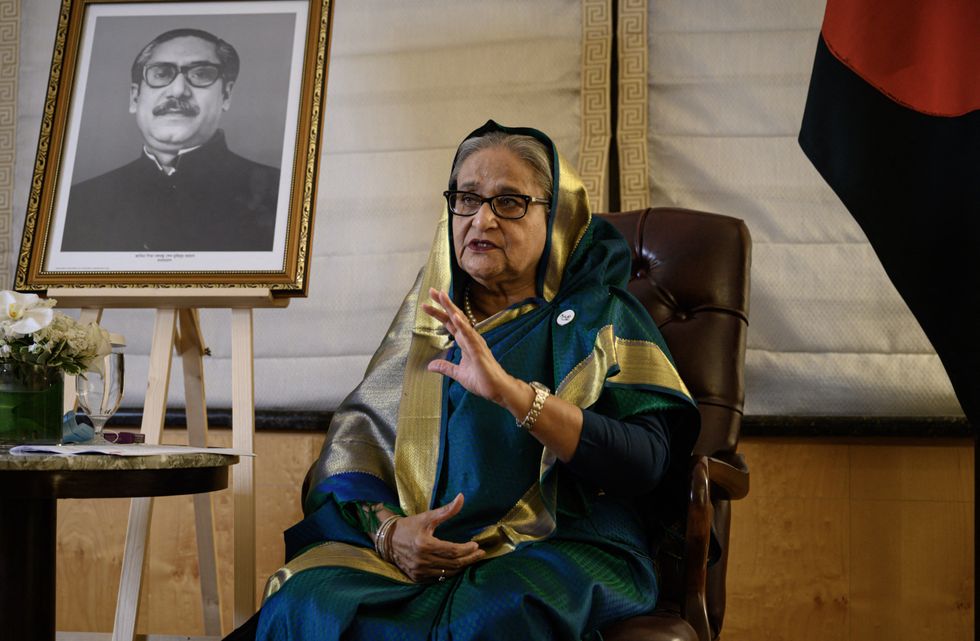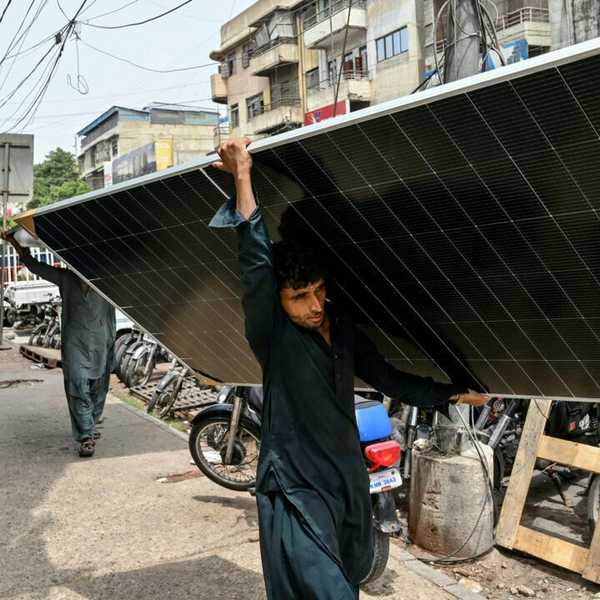Bangladesh PM Hasina resigns and flees, military takes over
Cheering protesters stormed PM's palace after she fled, the culmination of more than a month of deadly protests
Dubai Desk
The Dubai Desk reports on major developments across the UAE, covering news, culture, business, and social trends shaping the region.

Protesters are waving national flags as they are standing over the Anti Terrorism Raju Memorial Sculpture in Dhaka
AFP
Bangladeshi Prime Minister Sheikh Hasina fled the country on Monday, a source close to the leader told AFP, following more than a month of deadly anti-government protests.
Hasina, who has ruled since 2009, had defied weeks of demands for her to stand down but fled following a brutal day of unrest on Sunday in which nearly 100 people died.

Hasina, 76, fled the country by helicopter, a source close to the leader told AFP shortly after protesters had stormed her palace in Dhaka.
"Her security team asked her leave, she did not find any time to prepare", the source said.
Broadcaster CNN-News18 reported that Hasina landed in India's northeastern city of Agartala after fleeing.
Military to run government
In an address to the nation, Bangladesh's army chief General Waker-Uz-Zaman announced that the military would run the government, but stopped short of saying a curfew or emergency would be placed in the country.
He asked students to remain calm and give them time to find a solution, reported the BBC.
Protesters storm PM's palace after she flees
Jubilant looking crowds waved flags, some dancing on top of a tank in the streets of Dhaka on Monday morning, before hundreds broke through the gates of Hasina's official residence.
Bangladesh's Channel 24 broadcast images of crowds running into the premier's official residence in the capital, waving to the camera as they celebrated.
Student activists had called for a march to the capital Dhaka on Monday in defiance of a nationwide curfew to press Hasina to resign, a day after deadly clashes across the country killed nearly 100 people.
As protesters began to march in some places, armoured personnel carriers and troops patrolled the streets of the capital, Reuters TV showed. There was little civilian traffic, barring a few motorcycles and three-wheel taxis.
At least six people were killed in clashes between police and protesters in the Jatrabari and Dhaka Medical College areas on Monday, the Daily Star newspaper reported. Reuters could not immediately verify the report.
Police hurled sound grenades in some parts of the city to disperse small groups of protesters, the Bengali language Prothom Alo newspaper reported.
Elsewhere, thousands of protesters had surrounded law enforcement officers stationed in front of a key building, it said.
The military spokesperson's office had earlier said that "the public is requested to refrain from violence and be patient," until the army chief's address, Prothom Alo reported.
Bangladesh has been engulfed by protests and violence that began last month after student groups demanded scrapping of a controversial quota system in government jobs.
That escalated into a campaign to seek the ouster of Hasina, who won a fourth straight term in January in an election boycotted by the opposition.
At least 91 people were killed and hundreds injured on Sunday in a wave of violence across the country of 170 million people as police fired tear gas and rubber bullets to disperse tens of thousands of protesters.
Starting Sunday evening, a nationwide curfew has been imposed, the railways have suspended services and the country's huge garments industry has closed.
'Final protest'
Hasina has ruled Bangladesh since 2009 and won her fourth consecutive election in January after a vote without genuine opposition.
Her government is accused by rights groups of misusing state institutions to entrench its hold on power and stamp out dissent, including through the extrajudicial killing of opposition activists.
Demonstrations began over the reintroduction of a quota scheme that reserved more than half of all government jobs for certain groups.
The protests escalated despite the scheme having been scaled back by Bangladesh's top court.
Soldiers and police with armoured vehicles in Dhaka had barricaded routes to Hasina's office with barbed wire on Monday morning, but vast crowds flooded the streets, tearing down barriers.
The Business Standard newspaper estimated as many as 400,000 protesters were on the streets but it was impossible to verify the figure.
"The time has come for the final protest," said Asif Mahmud, one of the key leaders in the nationwide civil disobedience campaign.
In several cases, soldiers and police did not intervene to stem Sunday's protests, unlike during the past month of rallies that repeatedly ended in deadly crackdowns.
"Let's be clear: The walls are closing in on Hasina: She's rapidly losing support and legitimacy," Michael Kugelman, director of the South Asia Institute at the Washington-based Wilson Center, told AFP.
"The protests have taken on immense momentum, fuelled by raw anger but also by the confidence that comes with knowing that so much of the nation is behind them," he said.
In a hugely symbolic rebuke of Hasina, a respected former army chief demanded the government "immediately" withdraw troops and allow protests.
"Those who are responsible for pushing people of this country to a state of such an extreme misery will have to be brought to justice," ex-army chief General Ikbal Karim Bhuiyan told reporters Sunday.
The anti-government movement had attracted people from across society in the South Asian nation of about 170 million people, including film stars, musicians and singers.







Comments
See what people are discussing